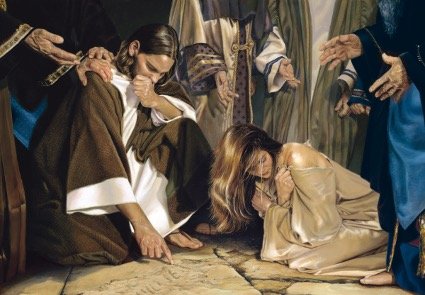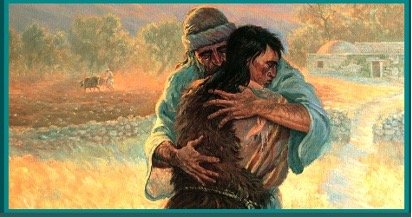
Gospel according to Saint John 8:1-11:
Jesus went to the Mount of Olives. But early in the morning he arrived again in the temple area, and all the people started coming to him, and he sat down and taught them. Then the scribes and the Pharisees brought a woman who had been caught in adultery and made her stand in the middle. They said to him, “Teacher, this woman was caught in the very act of committing adultery. Now in the law, Moses commanded us to stone such women. So what do you say?” They said this to test him, so that they could have some charge to bring against him. Jesus bent down and began to write on the ground with his finger.
But when they continued asking him, he straightened up and said to them, “Let the one among you who is without sin be the first to throw a stone at her.” Again he bent down and wrote on the ground. And in response, they went away one by one, beginning with the elders. So he was left alone with the woman before him. Then Jesus straightened up and said to her, “Woman, where are they? Has no one condemned you?” She replied, “No one, sir.” Then Jesus said, “Neither do I condemn you. Go, and from now on do not sin any more.”
Accusers in front of the mirror
Luis CASASUS President of the Idente Missionaries
Rome, April 06, 2025 | V Sunday of Lent
Is 43: 16-21; Phil 3: 8-14; Jn 8:1-11
Who knows? Perhaps the adulterous woman presented to Jesus today paradoxically wanted to save her marriage, as she knew that not having children was a reason for repudiation, as in many ancient systems of law.
Or it could be that someone seduced her, at a time when she could not bear the anguish or the abuse. The reality is that her action brought her to the brink of death at the hands of a mob that had no interest in her life; they wanted her to be a mere instrument to discredit the young Master.
In reality, Christ’s testimony of forgiveness begins before the distressing scene of the poor woman, in the first lines of today’s Gospel, as he was teaching in the Temple and, in the middle of his teaching, he is interrupted by those who envied and hated him. But he listens to them and pays attention to them.
This can be the first lesson in understanding and imitating the mercy that Christ showed at all times. When we talk about forgiveness, we normally think of serious offenses, faults or regrettable defects. But it all starts with forgiving small things, such as an interruption, forgetting an anniversary or a moment of anger.
This is true on an emotional level and especially in the spiritual life. That is why a mother makes sure that her two children give each other an embrace after having fought over the biggest piece of ice cream cake (I must confess that this is my personal case). But Christ’s promise is also fulfilled: if we are capable of forgiving the little things, we will receive the grace to do the same in serious, very serious matters that would make us lose patience. This is understandable because Providence prepares us so that we bear witness to a love characterized by mercy, the kind we all need at all times, the kind we receive from God the Father when we do something wrong that is unimportant or, on the contrary, essential, such as offending or ignoring our neighbor.
Although what we have heard in the Gospel is NOT a parable, I would like to illustrate and confirm it with a short story that reminds us of the importance of forgiving the little things.
Two brothers were walking together along a dusty path. As they talked, the younger brother, Samuel, was offended by a casual comment made by his brother. Although the comment was not serious, the younger brother took it as a lack of respect and spent the rest of the journey in silence, his heart heavy with resentment.
When they got home, their father saw them and asked:
Samuel, you seem worried. What’s wrong?
Samuel explained what had happened, hoping that his father would reprimand his brother. But the father smiled and said:
When the wind blows and moves the leaves on a tree, does the tree get angry?
No, Dad, Samuel replied.
Then why do you allow a simple breeze to disturb the peace of your heart? Small grievances are like the wind: they come and go. If you hold on to them, you only hurt yourself. Learn to let them go like the leaves do with the air.
—ooOoo—
When we forgive, our whole being is set in motion. Our memories, dreams, joys and sorrows take up their rightful place, the rightful space in the heart. Likewise, being aware of having been forgiven and of continuing to receive forgiveness makes us truly happy. This is what today’s First Reading exhorts us to:
Do not remember the past, do not think about what was before. For I am going to do something new; it is already sprouting, can you not feel it? I will make a way in the wilderness, and rivers in the desert. The beasts of the field will honor me, the jackals and the ostriches, because I give water in the wilderness, and rivers in the desert, to give drink to my people, my chosen, the people I formed for myself.
A good friend, talking about his wife, said to me: I can’t understand how she can love me, I’m not intelligent or very sensitive; I don’t understand how she can be so patient with me, how she puts up with my idiosyncrasies… My friend was not capable of understanding the forgiveness he had received. None of us are; it is something greater than our reasoning or our experiences. St. Paul writes in Philippians 4:7 that the peace of God, which surpasses all understanding, will guard your hearts and your minds in Christ Jesus.
Forgiveness is the cornerstone of any relationship, emotional, educational or otherwise. We take it for granted that others see – or should see – life as we do. However, there are as many perceptions and forms of sensitivity as there are people in this world. And so, our lack of understanding of the emotions and feelings of others creates gaps in the form of lack of communication, anger, estrangement and emotional disconnection. However, embracing forgiveness will help to bridge those gaps.
Forgiveness is characteristic of realistic and mature people, both psychologically and spiritually. It means knowing how to accept the annoyance that someone can cause me, for various reasons, consciously or unconsciously. A woman who suffered terribly during her childhood and early youth concluded: Forgiveness begins with giving up the hope that the past could have been different. Forgiveness requires accepting what happened as it happened rather than what could or should have happened.
Even if it is in some way our place to judge others, because we have to correct them or eventually impose a penalty on them, we have to be very aware of our personal condition as sinners, as useless servants.
Moses Maimonides (1135-1204), the most prominent Jewish philosopher of the Middle Ages, wrote:
The sages of old were extremely reluctant to be appointed [judges]. They avoided sitting on the bench unless they were sure that there was no one else as qualified as they were and that the judicial system would collapse if they did not serve. Even then, they only sat on the bench when the community and the elders pressured them, begging them to accept the appointment.
What did Jesus write when he knelt on the ground before the adulterous woman? Saint Jerome once suggested that he wrote the sins of the accusers, which does not seem very likely. However, the custom among Semitic peoples of scribbling on the ground while thinking or wanting to release tension or control irritation at someone else asking absurd or provocative questions is well documented.
Some believe that Jesus wrote down the sins of those who wanted to stone the woman, which would explain why they withdrew one by one. Or, based on Jeremiah 17:13 (Those who turn away from me will be written in the dust), he may have written the names of the Pharisees present there, as an act of judgment. Others suggest that Jesus may have written passages from the Law, recalling God’s mercy and justice. Some said that Christ wrote the woman’s name to show that her identity was not that of an “adulteress” or a “flagrant transgressor of the Law.” Of course, this moment makes us irresistibly curious, as it is the only time Jesus writes anything.
Since Scripture does not reveal it, the important thing about the passage is Jesus’ message of grace and forgiveness: Let him who is without sin cast the first stone. It was a brilliant way to bring about peace, first of all by avoiding violence and death, but also by provoking an implicit confession on the part of those who were willing to stone the woman.
Without a doubt, Christ’s gaze upon the poor woman was an injection of hope. The Master recognizes and warns her that she has acted badly, that she has caused harm and scandal. But he tells her: From now on do not sin again. If the Master, who has just forgiven me, said it, it is because it will be possible. It is because he will not abandon me. He will continue to look upon me with mercy. Although I’m sure I’ll sin again tomorrow, I’ll have the chance to ask for forgiveness, to look at him and have him look at me again, as we do in the Eucharist when we acknowledge our faults of thought, word, deed and omission… even if we don’t remember them all. But the celebrant lifts up the Body of Christ for us to look at, just as no doubt the woman about to be stoned looked at him. That is why our hope does not die. That is why, like her, we can renew our repentance.
By being aware of divine forgiveness, particularly through confession, what we normally call “trust in God” is transformed into true hope. That is the work of the Holy Spirit. Beyond feeling liberated from the burden of my sin, the essential thing is to see that Christ always finds a way to continue walking by my side, to invite me to share his desire and aspiration, however unworthy I may be. That is the kind of forgiveness that you and I should imitate as Christians. In the case of the adulterous woman, Jesus uses physical closeness, bending down and placing himself at the level of the one who was despised and threatened, so that she could feel his comforting closeness.
St. Matthew says (6:14-15): If you forgive others their transgressions, your heavenly Father will also forgive you. But if you do not forgive others their sins, your Father will not forgive your sins. The meaning of this phrase, which we repeat in the Lord’s Prayer, is not a threat, it is not that God will punish us by denying us his forgiveness, but rather that, having refused to forgive, we are not prepared to accept the forgiveness he tries to give us.
This page of today’s Gospel does not leave at peace those who continue to claim the right, from the inexpugnable fortress of their respectability, to throw stones no longer with their hands, but by defaming, isolating, pronouncing harsh judgments, feeding mistrust, spreading gossip and criticism. Jesus does not tolerate anyone who throws these painful and cruel stones at those who are struggling to get by, bent double under the weight of their own mistakes.
_______________________________
In the Sacred Hearts of Jesus, Mary and Joseph,
Luis CASASUS
President












